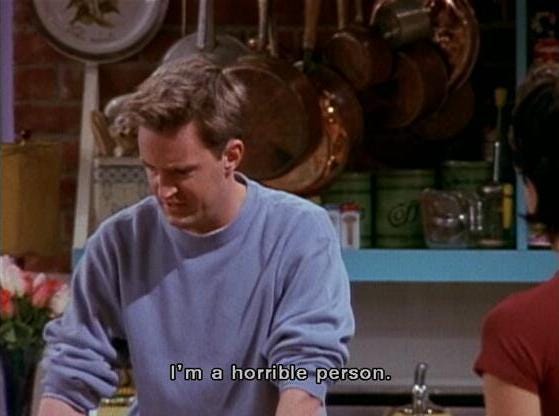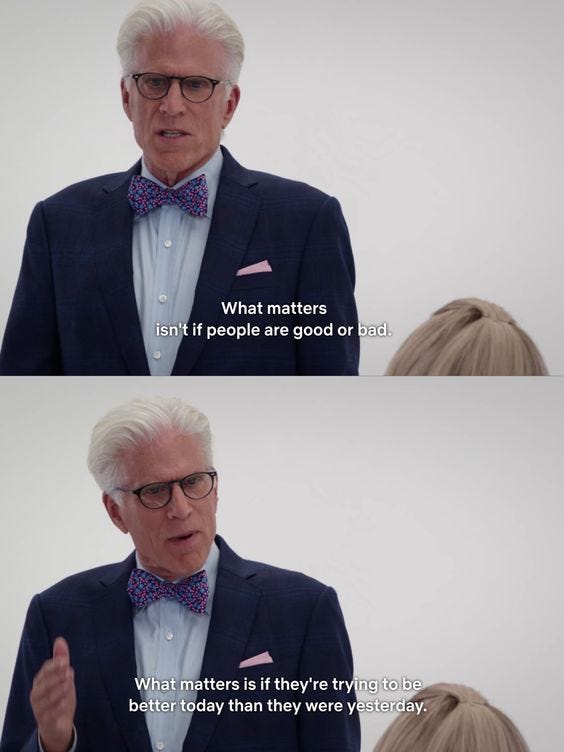Am I a good person?
The language we use to define morality and what it means to be "good" nowadays.
I wrote this piece for my class, Reporting the Zeitgeist, last semester. It's something I'm really proud of and wanted to share. Enjoy!
It was a Saturday night in early September, and I was home alone in my Brooklyn apartment, feeling a bit dejected about…well, everything. I had no plans that night, like many Saturday nights before. I had no significant other, and few prospects. I was graduating in three months with no job offers, and when I opened my email in an effort to distract myself, I received the following: “We have carefully considered your application, and at this time, unfortunately…” I didn’t finish reading.
Slumped in bed, eating the same meal for the fourth night that week, I opened Hinge, the dating app, hoping to find someone to connect with. But it seemed that all my “matches” had moved on. When I called up a friend to vent, she turned the call around — she was mad at me for forgetting to do the favor she’d asked. I apologized glumly, hung up, and suddenly found myself Googling the following words in silence: “Am I a good person?”
I don’t know what I really expected the internet to tell me, but I clicked on a quiz from a website called BlockSurvey that asked: When you’re standing in line at a coffee shop what do you usually do? The choices were:
A) Stare at the phone until the cashier calls you and then figure out what you want or
B) Figure out what you want and get your method of payment ready.
I closed my computer and zoned out to some sad girl music on my AirPods.
Turns out, I am far from the only person to ask the internet this question. In fact, this question led me down something of a rabbit hole: to lengthy forums on Reddit and Quora debating the question; personality quizzes claiming to be able to teach you to be better; and a plethora of “articles” from websites typically trying to sell you something, assuring you you're better than you think you are through signs like:
You’re honest
You’re optimistic
You’re wise
(But how would they know?)
And then, the statistic that stopped me in my tracks: According to Google Trends, the number of searches for “Am I a good person?” in the United States has been increasing since about 2010. In November 2023, two months after I first typed in the phrase, it reached peak popularity.
Perhaps I shouldn’t have been surprised; people have been questioning their morality since the dawn of time. But what was it about now that seemed to have caused the question to peak?
Looking to sources beyond ourselves to help us define our morality isn’t anything new. For centuries, people turned to religion to guide them in moral dilemmas — in fact, during the 17th century, some believed that there could be no morality without it. Later, in the 1900s, organizations like the Boy Scouts and Girl Scouts were established with a mission of instilling morality and ethics in young boys and girls. (Scout law states that every member should be “trustworthy, loyal, helpful, friendly, courteous, kind” — as well as “cheerful,” “thrifty,” and “clean.”) It was not uncommon back then for morals and ethics to be subjects upon which kids were actually graded on in schools.
But religious identity has been waning in recent years, as have social clubs and so-called “third place” establishments, like coffee shops or hair salons, where people once went to gather and socialize. During the pandemic, we were all limited in what and who we could interact with, having to rely on the internet to connect. Is it possible that, with fewer physical places to interact and bounce our thoughts and ideas off of each other, we’re losing some of our moral clarity?
My quest for answers led me to the place where most searches land a person these days: Back on the internet, where phrases and trends linked to self-care, like “protecting your peace,” hold grand promises of personal fulfillment.
“Protecting your peace” is basically defining your boundaries and weeding out the things or people that don’t bring some sense of peace to your life. I tried applying it to my own life since the concept seemed relatively straightforward: Set boundaries with things that don’t serve me (like overthinking and my fear of missing out) and make more time for myself.
So, I did things like take myself on solo movie dates and read more books instead of doom scrolling. For a while, I felt productive and motivated. But the internet took the idea one step further with a call to cut out toxic people, and with all the tools for how to do it. But the idea only induced me with fear. The more I read about it, and began reflecting on my own relationships, the more I began to wonder if people thought of me as a toxic or difficult person.
That sounds a little dramatic, but how could I not wonder that, when we use such damning language to describe morality nowadays?
If cancel culture has shown us anything, it’s that we’ve grown quite comfortable putting others into categories of “good”or "bad”; “nice” or “toxic.” But even that has caused me to self-question: I lie sometimes. Does that make me dishonest? I can be selfish. Am I a narcissist? It seems we’ve eliminated the possibility of making mistakes.
For me, that leads to an even bigger question: If I’m not a good person, then… what am I?
I talked with an assistant professor of behavioral science at the University of Chicago, Joshua Conrad Jackson, about my conundrum. He recently published a study on how the larger our social networks, both online and in person, the more likely we are to have a generalized view of morality. Meaning that instead of judging others’ moral attributes on a contextual basis, we’re more likely to put people “along one spectrum from good to bad.”
Jackson says this type of mindset potentially drives cancel culture. It might even be why I found myself Googling that question.
“There is a kind of social stigma to admitting that you might not be a morally good person,” says Graham, “I feel like we all want to project this moral confidence that we know exactly what our values are, and we live those values all the time, and that we’re a good person and that we can be trusted.”
Scott Wiltermuth, an associate professor at the University of Southern California, who researches unethical behaviors, says that social media can make people feel more down about themselves — and search for something within themselves. “If we see our friends with all sorts of fantastic trips and fantastic possessions, we may want assurance that the core of us is good,” he explained.
We want assurance that the core of us is good.
That statement made me realize that was what I’d been yearning for on my Saturday nights indoors. Even if I have my education, my health, and a few loyal friends, I’m blind to those things when the question “Am I a good person?” enters my mind. I dwell on the negative—what I don’t have and the areas where I can improve. But that’s just it—I keep questioning my morality and how I’m perceived, rather than how my behaviors affect others. That makes me think: do I care about being “good” or do I want to be “good enough?” And if it’s the latter, does that make me a bad person?
I called up one more psychologist, USC provost professor Norbert Schwarz, who told me that we all “fake it” in some way – and that whether it's explicit or implicit, there is a competitive aspect when it comes to morality.
“People are basically competing and presenting themselves as a better believer, as a less sinful fellow,” Schwarz says. “Most of which is in part self-deception and definitely self-presentation to fool others because your own social standing depends on other people finding you reasonably moral and trustworthy and honorable.”
Is this all to say that the internet and social media are bad places to question morality? Not necessarily. Some online resources can help you gain perspective or some reassurance.
Looking back at those Reddit or Quora forums, some users do respond with thoughtful advice. “There's nothing inherently positive or negative in finding like-minded people and finding support for your ideas,” says Schwarz. “Whether it's ethical or not depends on whether your ideas are ethical or not.”
And yet, NYU social psychology doctorate student Claire Robertson cautioned against using the internet for validation. “The people you trust and that know you as a full person are probably going to be more able to tell you what course of action you should take in your life,” she said.
It’s been more than six months since I first Googled those words, and the question of “am I a good person” still lives on in my mind. But I don’t feel alone in having these thoughts. If I’ve learned anything, it’s that, as cliche as it may sound, I need to remind myself that I am a human who’s allowed to fail and make mistakes – and I don’t need Google to tell me that.
Thank you guys so much for reading! Have a great weekend! xoxo






